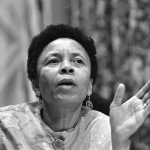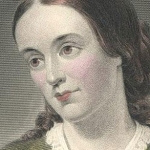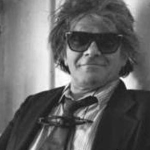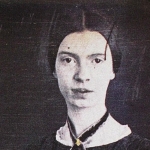A Death in the Desert by Robert Browning

[Supposed of Pamphylax the Antiochene:
It is a parchment, of my rolls the fifth,
Hath three skins glued together, is all Greek,
And goeth from Epsilon down to Mu:
Lies second in the surnamed Chosen Chest,
Stained and conserved with juice of terebinth,
Covered with cloth of hair, and lettered Xi,
From Xanthus, my wife's uncle, now at peace:
Mu and Epsilon stand for my own name.
I may not write it, but I make a cross
To show I wait His coming, with the rest,
And leave off here: beginneth Pamphylax.]
I said, "If one should wet his lips with wine,
"And slip the broadest plantain-leaf we find,
Read Poem It is a parchment, of my rolls the fifth,
Hath three skins glued together, is all Greek,
And goeth from Epsilon down to Mu:
Lies second in the surnamed Chosen Chest,
Stained and conserved with juice of terebinth,
Covered with cloth of hair, and lettered Xi,
From Xanthus, my wife's uncle, now at peace:
Mu and Epsilon stand for my own name.
I may not write it, but I make a cross
To show I wait His coming, with the rest,
And leave off here: beginneth Pamphylax.]
I said, "If one should wet his lips with wine,
"And slip the broadest plantain-leaf we find,
0
What Shall We Tell Our Children? An Addenda, 1973 by Margaret Burroughs

A lot of water has passed under the bridge since 1963. Then, my concernwas particularly for my own people and this version was written especially for them. I am happy that it has done and is doing its job. However, I want it to be known, that I am not a proponent of the concept of cultural nationalism. I dearly love and am proud of my good, serious, sincere black people, yet at the same time, my concern is with all people of goodwill no matter the color. I make no mystique of blackness. I am a humanist. Indeed, I am auniversalist. This truth, I know. The liberation of black people in the United States is tightly linked with the liberation of black people in the far flungdiaspora. Further, and more important, the liberation of black and oppressed people all over the world, is linked with the struggles of the workers of the world of every nationality and color against the common oppressors, overlords, and exploiters of their labor.
Thus it was only natural that I should write "What Shall We Tell Our Children?" in 1973. I have tried to tell them the facts of life and the truth as I see it:
I hope I have succeeded.
What shall we tell our children who are black?
What shall we tell our children who are white?
What shall we tell children of every race and hue?
For all children are the children of all of us
Read Poem Thus it was only natural that I should write "What Shall We Tell Our Children?" in 1973. I have tried to tell them the facts of life and the truth as I see it:
I hope I have succeeded.
What shall we tell our children who are black?
What shall we tell our children who are white?
What shall we tell children of every race and hue?
For all children are the children of all of us
0
The One in All by Margaret Fuller

There are who separate the eternal light
In forms of man and woman, day and night;
They cannot bear that God be essence quite.
Existence is as deep a verity:
Without the dual, where is unity?
And the ‘I am’ cannot forbear to be;
But from its primal nature forced to frame
Mysteries, destinies of various name,
Is forced to give what it has taught to claim.
Thus love must answer to its own unrest;
The bad commands us to expect the best,
And hope of its own prospects is the test.
Read Poem In forms of man and woman, day and night;
They cannot bear that God be essence quite.
Existence is as deep a verity:
Without the dual, where is unity?
And the ‘I am’ cannot forbear to be;
But from its primal nature forced to frame
Mysteries, destinies of various name,
Is forced to give what it has taught to claim.
Thus love must answer to its own unrest;
The bad commands us to expect the best,
And hope of its own prospects is the test.
0
A Vision of Poesy by Henry Timrod

PART I
I
In a far country, and a distant age,
Ere sprites and fays had bade farewell to earth,
A boy was born of humble parentage;
The stars that shone upon his lonely birth
Did seem to promise sovereignty and fame—
Yet no tradition hath preserved his name.
II
’T is said that on the night when he was born,
A beauteous shape swept slowly through the room;
Its eyes broke on the infant like a morn,
And his cheek brightened like a rose in bloom;
Read Poem I
In a far country, and a distant age,
Ere sprites and fays had bade farewell to earth,
A boy was born of humble parentage;
The stars that shone upon his lonely birth
Did seem to promise sovereignty and fame—
Yet no tradition hath preserved his name.
II
’T is said that on the night when he was born,
A beauteous shape swept slowly through the room;
Its eyes broke on the infant like a morn,
And his cheek brightened like a rose in bloom;
0
Paradise Lost: Book 12 (1674 version) by John Milton

AS one who in his journey bates at Noone,
Though bent on speed, so heer the Archangel paus'd
Betwixt the world destroy'd and world restor'd,
If Adam aught perhaps might interpose;
Then with transition sweet new Speech resumes.
Thus thou hast seen one World begin and end;
And Man as from a second stock proceed.
Much thou hast yet to see, but I perceave
Thy mortal sight to faile; objects divine
Must needs impaire and wearie human sense:
Henceforth what is to com I will relate,
Thou therefore give due audience, and attend.
This second sours of Men, while yet but few;
And while the dread of judgement past remains
Read Poem Though bent on speed, so heer the Archangel paus'd
Betwixt the world destroy'd and world restor'd,
If Adam aught perhaps might interpose;
Then with transition sweet new Speech resumes.
Thus thou hast seen one World begin and end;
And Man as from a second stock proceed.
Much thou hast yet to see, but I perceave
Thy mortal sight to faile; objects divine
Must needs impaire and wearie human sense:
Henceforth what is to com I will relate,
Thou therefore give due audience, and attend.
This second sours of Men, while yet but few;
And while the dread of judgement past remains
0
Don Juan: Canto 11 by Lord Byron (George Gordon)

I
When Bishop Berkeley said "there was no matter,"
And proved it—'twas no matter what he said:
They say his system 'tis in vain to batter,
Too subtle for the airiest human head;
And yet who can believe it! I would shatter
Gladly all matters down to stone or lead,
Or adamant, to find the World a spirit,
And wear my head, denying that I wear it.
II
What a sublime discovery 'twas to make the
Universe universal egotism,
That all's ideal—all ourselves: I'll stake the
World (be it what you will) that that's no schism.
Read Poem When Bishop Berkeley said "there was no matter,"
And proved it—'twas no matter what he said:
They say his system 'tis in vain to batter,
Too subtle for the airiest human head;
And yet who can believe it! I would shatter
Gladly all matters down to stone or lead,
Or adamant, to find the World a spirit,
And wear my head, denying that I wear it.
II
What a sublime discovery 'twas to make the
Universe universal egotism,
That all's ideal—all ourselves: I'll stake the
World (be it what you will) that that's no schism.
0
What Shall I Tell My Children Who Are Black (Reflections of an African-American Mother) by Margaret Burroughs

1963
What shall I tell my children who are black
Of what it means to be a captive in this dark skin
What shall I tell my dear one, fruit of my womb,
Of how beautiful they are when everywhere they turn
They are faced with abhorrence of everything that is black.
Villains are black with black hearts.
Read Poem Of what it means to be a captive in this dark skin
What shall I tell my dear one, fruit of my womb,
Of how beautiful they are when everywhere they turn
They are faced with abhorrence of everything that is black.
Villains are black with black hearts.
0
Paradise Lost: Book 6 (1674 version) by John Milton

ALL night the dreadless Angel unpursu'd
Through Heav'ns wide Champain held his way, till Morn,
Wak't by the circling Hours, with rosie hand
Unbarr'd the gates of Light.There is a Cave
Within the Mount of God, fast by his Throne,
Where light and darkness in perpetual round
Lodge and dislodge by turns, which makes through Heav'n
Grateful vicissitude, like Day and Night;
Light issues forth, and at the other dore
Obsequious darkness enters, till her houre
To veile the Heav'n, though darkness there might well
Seem twilight here; and now went forth the Morn
Such as in highest Heav'n, arrayd in Gold
Empyreal, from before her vanisht Night,
Shot through with orient Beams: when all the Plain
Read Poem Through Heav'ns wide Champain held his way, till Morn,
Wak't by the circling Hours, with rosie hand
Unbarr'd the gates of Light.There is a Cave
Within the Mount of God, fast by his Throne,
Where light and darkness in perpetual round
Lodge and dislodge by turns, which makes through Heav'n
Grateful vicissitude, like Day and Night;
Light issues forth, and at the other dore
Obsequious darkness enters, till her houre
To veile the Heav'n, though darkness there might well
Seem twilight here; and now went forth the Morn
Such as in highest Heav'n, arrayd in Gold
Empyreal, from before her vanisht Night,
Shot through with orient Beams: when all the Plain
0
from The Prelude: Book 2: School-time (Continued) by William Wordsworth

Thus far, O Friend! have we, though leaving much
Unvisited, endeavour'd to retrace
My life through its first years, and measured back
The way I travell'd when I first began
To love the woods and fields; the passion yet
Was in its birth, sustain'd, as might befal,
By nourishment that came unsought, for still,
From week to week, from month to month, we liv'd
A round of tumult: duly were our games
Prolong'd in summer till the day-light fail'd;
No chair remain'd before the doors, the bench
And threshold steps were empty; fast asleep
The Labourer, and the old Man who had sate,
A later lingerer, yet the revelry
Continued, and the loud uproar: at last,
Read Poem Unvisited, endeavour'd to retrace
My life through its first years, and measured back
The way I travell'd when I first began
To love the woods and fields; the passion yet
Was in its birth, sustain'd, as might befal,
By nourishment that came unsought, for still,
From week to week, from month to month, we liv'd
A round of tumult: duly were our games
Prolong'd in summer till the day-light fail'd;
No chair remain'd before the doors, the bench
And threshold steps were empty; fast asleep
The Labourer, and the old Man who had sate,
A later lingerer, yet the revelry
Continued, and the loud uproar: at last,
0
Writ on the Steps of Puerto Rican Harlem by Gregory Corso

There’s a truth limits man
A truth prevents his going any farther
The world is changing
The world knows it’s changing
Heavy is the sorrow of the day
The old have the look of doom
The young mistake their fate in that look
That is truth
Read Poem A truth prevents his going any farther
The world is changing
The world knows it’s changing
Heavy is the sorrow of the day
The old have the look of doom
The young mistake their fate in that look
That is truth
0
The Song of the Happy Shepherd by William Butler Yeats

The woods of Arcady are dead,
And over is their antique joy;
Of old the world on dreaming fed;
Grey Truth is now her painted toy;
Yet still she turns her restless head:
But O, sick children of the world,
Of all the many changing things
In dreary dancing past us whirled,
To the cracked tune that Chronos sings,
Words alone are certain good.
Where are now the warring kings,
Word be-mockers? —By the Rood
Where are now the warring kings?
An idle word is now their glory,
By the stammering schoolboy said,
Read Poem And over is their antique joy;
Of old the world on dreaming fed;
Grey Truth is now her painted toy;
Yet still she turns her restless head:
But O, sick children of the world,
Of all the many changing things
In dreary dancing past us whirled,
To the cracked tune that Chronos sings,
Words alone are certain good.
Where are now the warring kings,
Word be-mockers? —By the Rood
Where are now the warring kings?
An idle word is now their glory,
By the stammering schoolboy said,
0
An Hymn Of Heavenly Beauty by Edmund Spenser

Rapt with the rage of mine own ravish'd thought,
Through contemplation of those goodly sights,
And glorious images in heaven wrought,
Whose wondrous beauty, breathing sweet delights
Do kindle love in high-conceited sprights;
I fain to tell the things that I behold,
But feel my wits to fail, and tongue to fold.
Read Poem Through contemplation of those goodly sights,
And glorious images in heaven wrought,
Whose wondrous beauty, breathing sweet delights
Do kindle love in high-conceited sprights;
I fain to tell the things that I behold,
But feel my wits to fail, and tongue to fold.
0
Octaves by Edwin Arlington Robinson

I
We thrill too strangely at the master's touch;
We shrink too sadly from the larger self
Which for its own completeness agitates
And undetermines us; we do not feel—
We dare not feel it yet—the splendid shame
Of uncreated failure; we forget,
The while we groan, that God's accomplishment
Read Poem We thrill too strangely at the master's touch;
We shrink too sadly from the larger self
Which for its own completeness agitates
And undetermines us; we do not feel—
We dare not feel it yet—the splendid shame
Of uncreated failure; we forget,
The while we groan, that God's accomplishment
0
Satire III by John Donne

Kind pity chokes my spleen; brave scorn forbids
Those tears to issue which swell my eyelids;
I must not laugh, nor weep sins and be wise;
Can railing, then, cure these worn maladies?
Is not our mistress, fair Religion,
As worthy of all our souls' devotion
As virtue was in the first blinded age?
Are not heaven's joys as valiant to assuage
Lusts, as earth's honour was to them? Alas,
As we do them in means, shall they surpass
Us in the end? and shall thy father's spirit
Meet blind philosophers in heaven, whose merit
Of strict life may be imputed faith, and hear
Thee, whom he taught so easy ways and near
To follow, damn'd? Oh, if thou dar'st, fear this;
Read Poem Those tears to issue which swell my eyelids;
I must not laugh, nor weep sins and be wise;
Can railing, then, cure these worn maladies?
Is not our mistress, fair Religion,
As worthy of all our souls' devotion
As virtue was in the first blinded age?
Are not heaven's joys as valiant to assuage
Lusts, as earth's honour was to them? Alas,
As we do them in means, shall they surpass
Us in the end? and shall thy father's spirit
Meet blind philosophers in heaven, whose merit
Of strict life may be imputed faith, and hear
Thee, whom he taught so easy ways and near
To follow, damn'd? Oh, if thou dar'st, fear this;
0
Erinna by Letitia Elizabeth Landon

Was she of spirit race, or was she one
Of earth's least earthly daughters, one to whom
A gift of loveliness and soul is given,
Only to make them wretched?There is an antique gem, on which her brow
Retains its graven beauty even now.
Her hair is braided, but one curl behind
Floats as enamour'd of the summer wind;
The rest is simple. Is she not too fair
Read Poem Of earth's least earthly daughters, one to whom
A gift of loveliness and soul is given,
Only to make them wretched?There is an antique gem, on which her brow
Retains its graven beauty even now.
Her hair is braided, but one curl behind
Floats as enamour'd of the summer wind;
The rest is simple. Is she not too fair
0
The Phoenix and the Turtle by William Shakespeare

Let the bird of loudest lay
On the sole Arabian tree
Herald sad and trumpet be,
To whose sound chaste wings obey.
But thou shrieking harbinger,
Foul precurrer of the fiend,
Augur of the fever's end,
Read Poem On the sole Arabian tree
Herald sad and trumpet be,
To whose sound chaste wings obey.
But thou shrieking harbinger,
Foul precurrer of the fiend,
Augur of the fever's end,
0
Tell all the truth but tell it slant — (1263) by Emily Dickinson

Tell all the truth but tell it slant —
Success in Circuit lies
Too bright for our infirm Delight
The Truth's superb surprise
As Lightning to the Children eased
With explanation kind
The Truth must dazzle gradually
Or every man be blind —
Read Poem Success in Circuit lies
Too bright for our infirm Delight
The Truth's superb surprise
As Lightning to the Children eased
With explanation kind
The Truth must dazzle gradually
Or every man be blind —
0
Psalm 51 by Mary Sidney Herbert Countess of Pembroke

O Lord, whose grace no limits comprehend;
Sweet Lord, whose mercies stand from measure free;
To me that grace, to me that mercy send,
And wipe, O Lord, my sins from sinful me.
Oh, cleanse, oh, wash, my foul iniquity;
Cleanse still my spots, still wash away my stainings,
Till stains and spots in me leave no remainings.
For I, alas, acknowledging do know
My filthy fault, my faulty filthiness
To my soul’s eye incessantly doth show,
Which done to thee, to thee I do confess,
Just judge, true witness, that for righteousness
Thy doom may pass against my guilt awarded,
Thy evidence for truth may be regarded.
Read Poem Sweet Lord, whose mercies stand from measure free;
To me that grace, to me that mercy send,
And wipe, O Lord, my sins from sinful me.
Oh, cleanse, oh, wash, my foul iniquity;
Cleanse still my spots, still wash away my stainings,
Till stains and spots in me leave no remainings.
For I, alas, acknowledging do know
My filthy fault, my faulty filthiness
To my soul’s eye incessantly doth show,
Which done to thee, to thee I do confess,
Just judge, true witness, that for righteousness
Thy doom may pass against my guilt awarded,
Thy evidence for truth may be regarded.
0
A Spring Song by Donald Davie

“stooped to truth and moralized his song” Spring pricks a little. I get out the maps. Time to demoralize my song, high time.
Read Poem 0
from The Seasons: Winter by James Thomson

See, Winter comes to rule the varied year,
Sullen and sad, with all his rising train—
Vapours, and clouds, and storms. Be these my theme,
These, that exalt the soul to solemn thought
And heavenly musing. Welcome, kindred glooms!
Congenial horrors, hail! With frequent foot,
Pleas’d have I, in my cheerful morn of life,
When nurs’d by careless solitude I liv’d
And sung of Nature with unceasing joy,
Pleas’d have I wander’d through your rough domain;
Trod the pure virgin-snows, myself as pure;
Heard the winds roar, and the big torrent burst;
Or seen the deep-fermenting tempest brew’d
In the grim evening-sky. Thus pass’d the time,
Till through the lucid chambers of the south
Read Poem Sullen and sad, with all his rising train—
Vapours, and clouds, and storms. Be these my theme,
These, that exalt the soul to solemn thought
And heavenly musing. Welcome, kindred glooms!
Congenial horrors, hail! With frequent foot,
Pleas’d have I, in my cheerful morn of life,
When nurs’d by careless solitude I liv’d
And sung of Nature with unceasing joy,
Pleas’d have I wander’d through your rough domain;
Trod the pure virgin-snows, myself as pure;
Heard the winds roar, and the big torrent burst;
Or seen the deep-fermenting tempest brew’d
In the grim evening-sky. Thus pass’d the time,
Till through the lucid chambers of the south
0